Iran Indicts 11 Protesters Over Basij Agent's Death
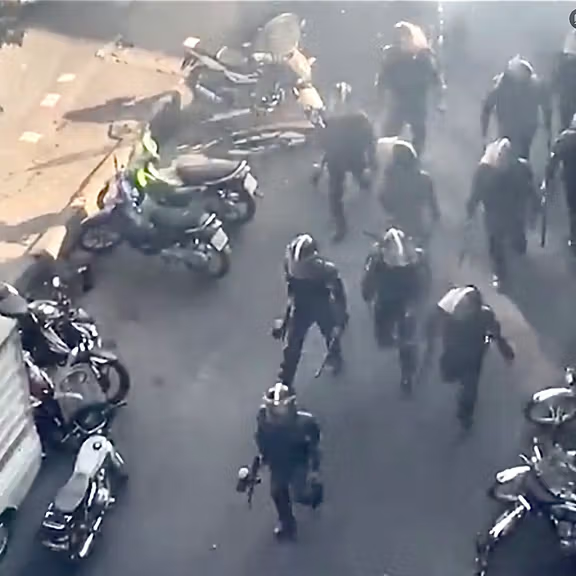
Iran's hardline judiciary has indicted 11 people over the killing of a Basij security force member during recent protests that could carry the death sentence.

Iran's hardline judiciary has indicted 11 people over the killing of a Basij security force member during recent protests that could carry the death sentence.
News agency IRNA said some of the 10 men and one woman were charged with "corruption on earth", which can be punishable by death, for the alleged killing of a member of IRGC’s Basij militia on November 3 in Karaj near Tehran.
The activist HRANA news agency said 336 protesters had been killed in the unrest as of Friday, including 52 minors. Thirty-nine members of the security forces had also been killed, while nearly 15,100 have been detained, it said.
Basij militia are always deployed against protesters and are notorious in using violence. So far, the government has not indicted any of its personnel for violence against citizens.
The Iranian government has labeled the protests as riots fomented by “enemies” including the United States.
UN experts have urged Iran "to stop using the death penalty as a tool to squash protests", noting that charges carrying the death penalty were brought against eight people in Tehran on October 29.
Iranians from all walks of life have taken part in protests, with unprecedented support voiced from abroad and by Iranian celebrities and athletes.
The unrest has added to strains in Iran's ties with Western powers which have imposed sanctions on Iranian groups and individuals linked to the crackdown.
German Chancellor Olaf Scholz said he favored a new round of European Union sanctions next week.
"We want to continue to step up the pressure on the Revolutionary Guard Corps and the political leadership," he said in a video posted on Twitter.
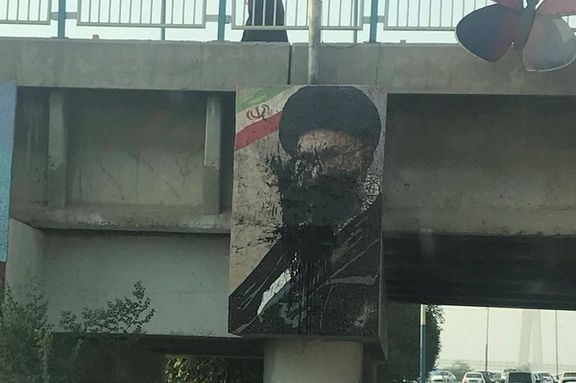
Western officials have been meeting with Iranian activists abroad while the United Nations may step up pressure on Tehran for the harsh crackdown on protests.
The first high-level western official to meet with an Iranian activist was US Vice President Kamala Harris who in her meeting with Iran-born actress and activist Nazanin Boniadi October 14 underscored that the Biden-Harris Administration would continue to stand with Iranian women and citizens.
Two weeks later, on October 29, Canadian Prime Minister Justine Trudeau became the first world leader to join Iranians at a demonstration in Ottawa. Trudeau hinted at the possibility of regime change in Iran in his exchange of words with Iranian activists including Hamed Esmaeilion who initiated global rallies against the Islamic Republic soon after the protests began.
French President Emmanuel Macron also met Friday with a delegation of expat activists and rights advocates -- including Masih Alinejad, Shima Babaei, and Ladan Boroumand. Macron was the first western leader to refer to the Iranian protest movement as a “revolution”.
German Chancellor Olaf Scholz also said a video posted on Twitter Saturday that he favors a new round of European Union sanctions on Iran next week to step up the pressure on the Revolutionary Guards (IRGC) and the political leadership.
Majid Golpour, Paris-based international affairs expert, told Iran International TV Friday that the European Union will completely revise its general Iran policies “in form and content” within the next ten days and member states will release official statements outlining the new measures they will adopt vis-à-vis the Islamic Republic in the light of the developments in the past two months.
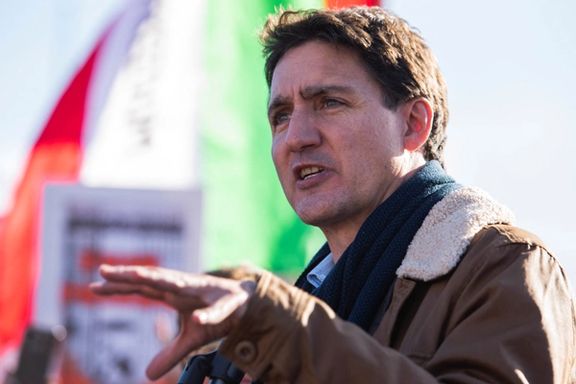
These measures, Golpour added, may include closure of EU embassies in Tehran and establishing secure channels for European parliamentarians’ contact with “Iranian civil society” and its activists while also no longer overlooking Iran's breaches of the 2015 nuclear agreement such as higher uranium enrichment and stockpiling to ensure the deal could be restored.
The four world powers have submitted a draft resolution to the board of the International Atomic Energy Agency (IAEA) which requires Iran to urgently explain uranium traces found at three undeclared sites, Reuters reported Friday. Iran has agreed to hold a meeting with IAEA officials in Tehran after next week's IAEA board meeting to resolve outstanding issues.
Deputy chief of the Iranian Judiciary Kazem Gharibabadi told reporters in New York Saturday that he planned to take part in meetings of the UN General Assembly Third Committee to hinder the “circulation of hostile and fake narratives by the West and the US on recent developments in Iran.”
Calling the recent protests “riots”, he claimed that the imprisonment of thousands of protesters, as rights groups have reported, is false and that foreign enemies were seeking to put pressure on Iran for their own political gain.
Germany and Iceland have called for an urgent meeting of the UN Human Rights Council on the situation in Iran.
UN experts, including Javaid Rehman, Special Rapporteur on the situation of human rights in Iran Friday, urged Tehran to stop indicting people with charges that carry the death penalty for participation in peaceful protests.
“The experts also urged immediate release of all those arrested for peacefully protesting arbitrarily for ‘exercising their legitimate rights to freedom of opinion and expression, association and peaceful assembly and for their actions to promote and protect human rights and fundamental freedoms through peaceful means.”
On November 6, 227 members of the Iranian Parliament called on the judiciary to act decisively against people arrested during the protests using even the death penalty.

Antigovernment demonstrations continued in Iran on Saturday, with gatherings, sit-ins, and student protests in various cities.
In the capital Tehran students of Tehran, Sharif, Science and Culture, and Beheshti universities staged protests to show anger at the apprehension of their colleagues by security forces. Reports say that more than 200 university student shave been detained since September.
In Kharazmi University of Karaj, west of Tehran, students chanted slogans such as, “People, why are you sitting still? You are our savior” and "They have killed students and replaced them with Mullahs.”
The students at Esfahan University of Arts also wrote in a statement that at a time when coffins of young people are being carried, they will not attend lectures, either in person or online.
In the south, students of Hormozgan University of Medical Sciences went on strike and refused to attend classes and hospital duties in support of students suspended during the protests.
Students have been at the forefront of demonstrations against Iran’s authoritarian regime within the past eight weeks.
Based on the latest report by the Oslo-based Iran Human Rights Organization at least 326 people including 43 children and 25 women have been killed by security forces in the ongoing nationwide protests.
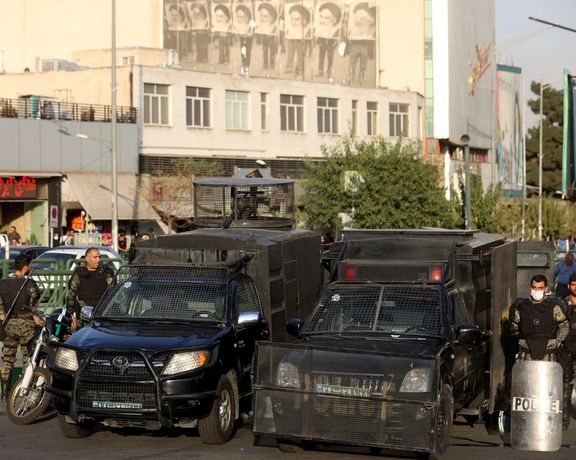
A group of experts at the United Nations have urged Iranian authorities to stop indicting protesters with charges punishable by the death penalty.
Sixteen UN-appointed independent human rights experts urged the Iranian government in a statement on Friday to stop using the death penalty as a tool to squash protests.
“We reiterate our call to immediately release all protesters who have been arbitrarily deprived of their liberty for the sole reason of exercising their legitimate rights to freedom of opinion and expression, association and peaceful assembly and for their actions to promote and protect human rights and fundamental freedoms through peaceful means,” they said in the statement.
Eight people were charged on October 29 in Tehran with crimes carrying the death penalty, namely “waging war against God” or “moharebeh” and “corruption on earth”. Two days later, the Tehran prosecutor announced that some 1,000 indictments had been issued in connection with recent “riots” in Tehran province alone.
Earlier, a group of 227 parliament members in Iran called on the Judiciary to issue death sentences for some people arrested during the ongoing antigovernment protests.
“With the continuous repression of protests, many more indictments on charges carrying the death penalty and death sentences might soon be issued, and we fear that women and girls …might be particularly targeted”, warned the UN experts.
Since September 16, authorities have detained thousands of protesters, including many women, children, youth and at least 51 journalists, 37 of whom remain in jail – many incommunicado.

German Chancellor Olaf Scholz has slammed government violence against Iranian protesters calling for a new round of EU sanctions on the Islamic Republic next week.
“We want to continue to step up the pressure on the IRGC and the political leadership,” the German chancellor said in a video posted on Twitter.
Criticizing the clerical regime he said in the video, “What kind of a government are you that shoots at its own citizens? Anyone who acts like this must count on our resistance.”
His comments were in response to Iranian Foreign Minister Hossein Amir-Abdollahian who earlier criticized Germany’s Foreign Minister Annalena Baerbock for denouncing Iran’s crackdown on demonstrators.
Iran’s government reacts to any criticism of its human rights violations by accusing other countries and international organizations of interfering in its internal affairs. All top officials of the Islamic Republic have claimed that the ongoing protests were organized by “enemies,” generally meaning the United States and its allies. Some officials have even threatened Saudi Arabia for allegedly supporting media reporting on the protests.
Amir-Abdollahian tweeted Thursday that “Undermining old ties has long-term consequences and Germany can choose engagement to address shared challenges or confrontation,” adding that “Our response will be proportionate and firm.”
However, Scholz said, “The Iranian government is solely responsible for the explosion of violence.”
“We must pay heed and take action when human rights are violated. We are witnessing the Iranians’ brave fight for greater freedom and justice, and the brutal violence against them. Sanctions are one way in which we are stepping up the pressure on the regime," reiterated the German chancellor.
The latest estimate by an Iranian human rights organization based abroad put the number of protesters killed by security forces at 326, including 43 children. Thousands have also been arrested by the government has not released any figures.
Scholz said the ongoing protests sparked by the Sept. 16 death of 22-year-old Mahsa Amini following her detention by Iran’s morality police were no longer “merely a question of dress codes” but had evolved into a fight for freedom and justice.
Scholz further mentioned that “We see the struggle for freedom and justice, and we see Iranian drones attacking and killing Ukrainians. All of this is totally unacceptable.”
He restated that there should be further EU sanctions against Iran. “Words alone were not enough in view of the brutality and contempt for human beings,” underlined the German chancellor.
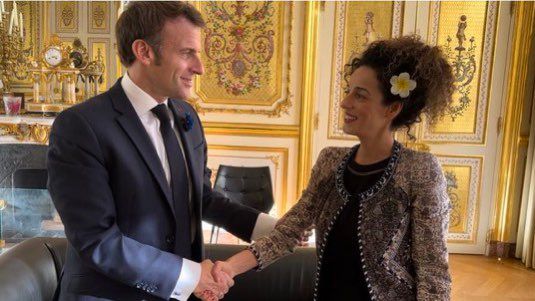
French President Emmanuel Macron has met Iranian female activists and has hailed the protests in Iran against the Islamic Republic, calling it a “revolution”.
During a meeting with a delegation of exiled female Iranian rights activists, the French president said, “We welcomed with great honor and pleasure a delegation of Iranian women,” adding “I want here to really emphasize to them again our respect and our admiration in the context of the revolution they are leading.”
According to the Elysee, the delegation included US-based activist Masih Alinejad, Shima Babaei, and Ladan Boroumand, the co-founder of a Washington-based rights group.
After the visit, Masih Alinejad wrote in a tweet that “France can be the first country to officially recognize this revolution. France must meet the Iranian opposition instead of regime officials and to prepare the EU for a secular Iran.”
She also noted that “I attended this meeting with a delegation of Iranian women in order to present a clear image of the regime’s crimes,” stating that Roya Piraei, whose mom was killed in the revolution, told Macron not to shake hands with Iranians’ killers.”
On Thursday, Masih Alinejad also announced the start of the “The World Liberty Congress” which she said founded with former world chess champion Garry Kasparov and Leopoldo Lopez, two activists opposing the governments of Russia and Venezuela.
Nine weeks into the uprising of the Iranian people against autocratic clerical rule, well over 300 people, including 41 children and 24 women have been killed by security forces.